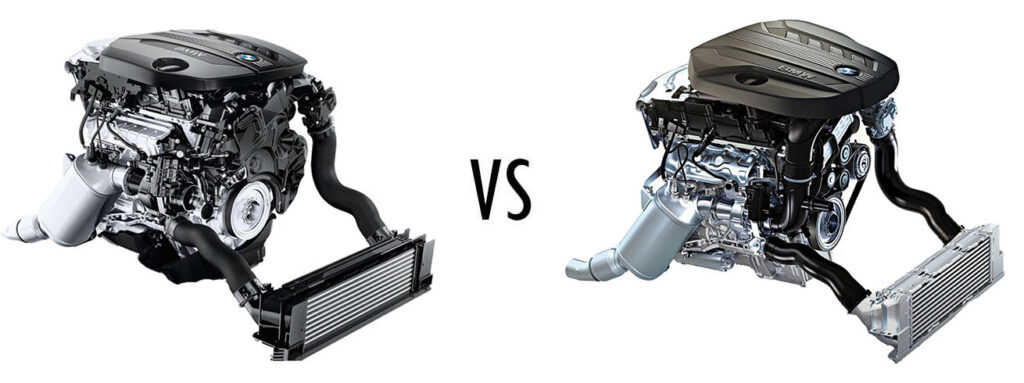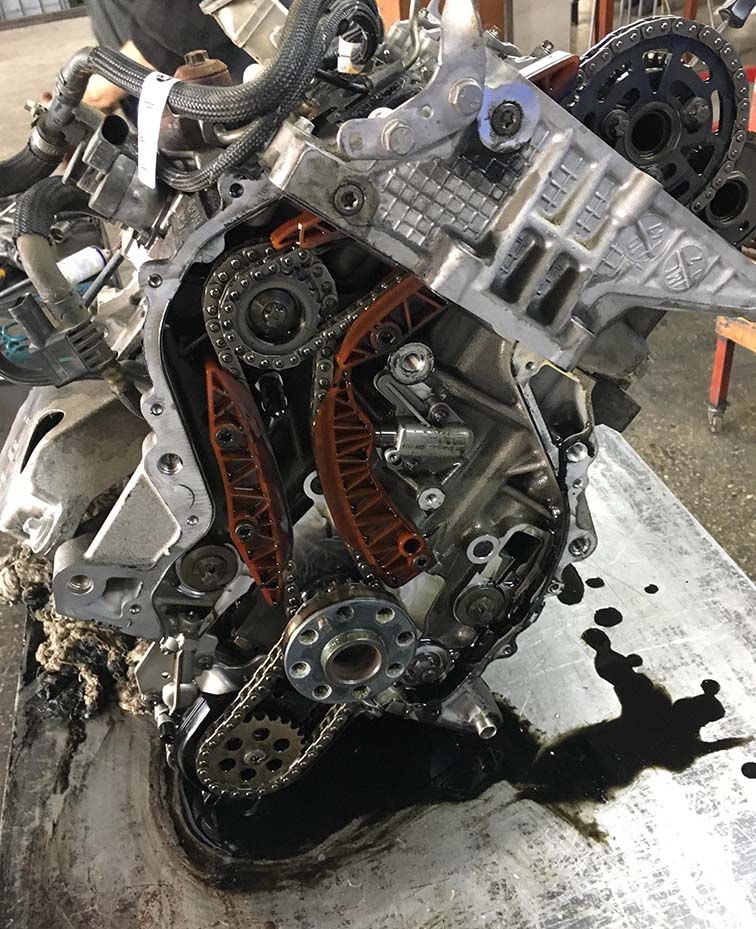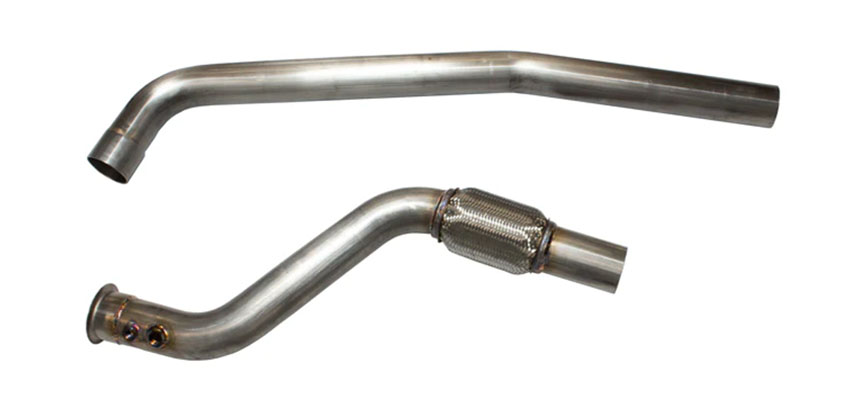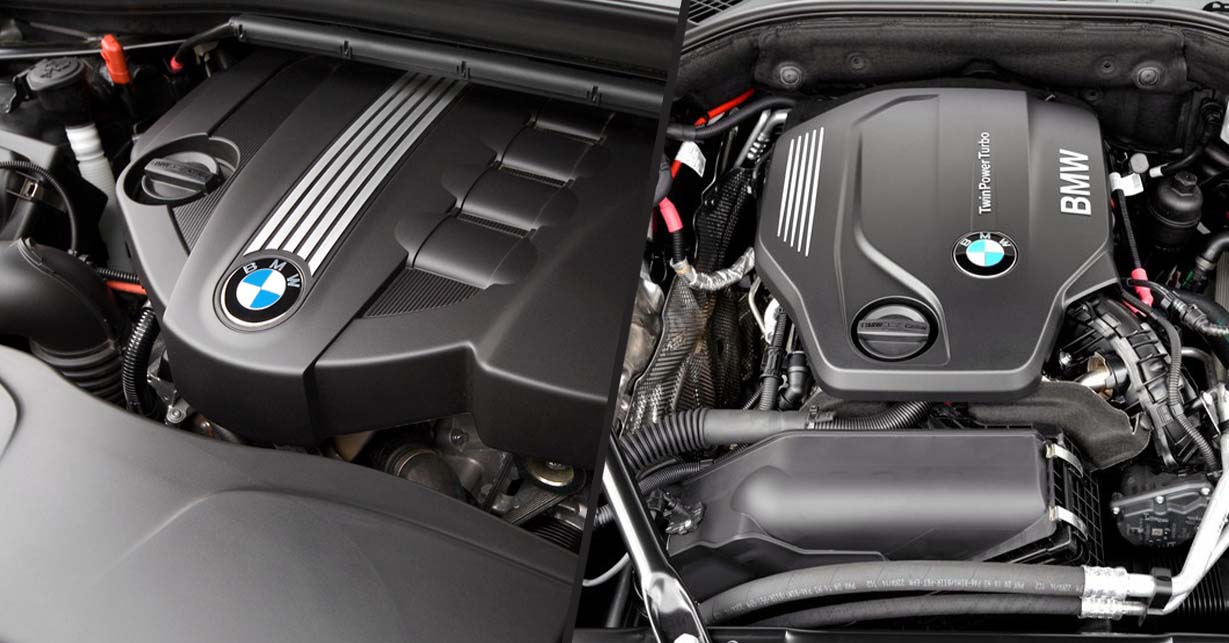The N47 and B47 engines represent two generations of BMW’s 4-cylinder diesel powertrains. The B47 debuted in 2014 as a replacement for the N47 and brought improvements in terms of power, efficiency, refinement, and reliability. Both engines are BMW’s diesel workhorses and power a wide range of vehicles from the compact X1 to the 5 Series.
In this article, we’ll compare the N47 vs. the B47 in terms of horsepower, torque, power delivery, engine sound, fuel efficiency, and reliability.
BMW N47 vs. BMW B47 Specifications:

| N47 (N47D20) | B47 (B47D20) | |
|---|---|---|
| Configuration | Inline-4 | Inline-4 |
| Displacement | 1,995 cc | 1,995 cc |
| Horsepower | 181 hp @ 4,000 RPM (F30 320d) | 188 hp @ 4,000 RPM (G20 320d) |
| Torque | 280 lb-ft @ 1,750 – 2,750 RPM (F30 320d) | 295 lb-ft @ 1,750 – 2,500 RPM (G20 320d) |
| Bore & Stroke | 84.0 mm x 90.0 mm | 84.0 mm x 90.0 mm |
| Compression Ratio | 16.5:1 | 16.5:1 |
| Turbocharger | Single-turbo | Single-turbo or twin-turbo |
| Emissions Target Standard | Euro 5 | Euro 6 |
N47 vs. B47: Horsepower, Torque & Power Delivery
The N47 engine in the F30 320d produces 181 horsepower peaking at 4,000 RPM and 280 lb-ft of torque between 1,750 and 2,750 RPM, while the B47 in the G20 320d generates 188 horsepower at 4,000 RPM and 295 lb-ft of torque between 1,750 and 2,500 RPM. The horsepower and torque figures aren’t that different and maximum torque is achieved at almost the same RPMs.
The B47 engine shows a modest increase in power output over the N47, but the difference in power isn’t big enough to be noticed by most drivers. The N47 is already a torquey engine with more than adequate low-end power.
The B47 has a slight horsepower and torque advantage and less turbo lag
Both the N47 and B47 have very similar power delivery characteristics, as expected as they’re both turbodiesel engines with the exact same displacement. They both output strong low-end torque, which comes in handy in the city or for light towing. A weakness of both of these engines is that power dies off early in the RPM range, peaking at 4,000 RPM.
The main difference you’ll notice is that the B47 has slightly less turbo lag, making it feel more responsive and providing a smoother driving experience with more even power delivery.
N47 vs. B47: Reliability & Common Issues
The main advantage of the B47 engine over the N47 is its improved reliability. The N47 is notorious for its poor timing chain design, which leads to premature timing chain wear and eventual failure.
If you own an early N47, you will eventually need to replace the timing chain, timing chain guides, and crank, a costly labor-intensive repair. If left unchecked, the timing chain could skip and lead to catastrophic engine failure. Timing chain problems on the N47 are widespread but the most seriously affected engines are those manufactured before 2011.

The N47 experiences timing chain issues which can lead to costly repairs
On the other hand, the B47 no longer suffers from timing chain issues due to a redesigned timing chain and guides, making it a more reliable engine. Reported issues with the B47 include EGR problems, but these are generally less severe than the N47’s timing chain issues. Both engines will require Diesel Particulate Filter (DPF) replacements at high mileage. Neither engine is as reliable as the older M47 engine.
Common N47 engine issues:
- Premature timing chain wear.
- Faulty return spring on turbo wastegates.
- EGR cooler issues.
- Vacuum leaks due to old hoses breaking down.
Common B47 engine issues:
- EGR valve failure.
- EGR cooler issues.
Our main recommendation to keep both of these diesel engines reliable is to get them up to temperature often and change the oil more frequently than BMW officially recommends. The N47 timing chain issues are made worse by extended oil changes, to the point where BMW modified the oil change schedule to make it more frequent.
N47 vs. B47: Engine Sound & Refinement
As 4-cylinder diesel engines, both the N47 and B47 are noisy and clattery, especially when idling right after a cold start. The N47 is especially notorious for sounding quite rough even inside the isolated cabin of a BMW. N47s that are in the early stages of a timing chain failure are even louder.
The B47 is quieter and more refined, with a more pleasing sound in the cabin and around the engine bay. This is particularly noticeable at idle, where the engine noise is less intrusive and more refined than in the N47.
Don’t expect the nicest sounds to come out of either of these engines, but it seems like BMW did improve noise, vibration, and harshness for the B47.
N47 vs. B47: Tuning & Modifications
While the B47 is a more modern engine, the N47 has a more established and mature tuning community with many more ECU tunes and modifications available. N47 enthusiasts have spent more than a decade refining performance enhancements for the N47, making it a more robust platform.
The N47 is better for tuning as it has a large and mature community around it
Common modifications for the N47 include ECU remapping, DPF delete, swirl flap removal, and EGR removal. For considerable power gains, the turbocharger can be upgraded to a bigger unit as well. A simple ECU remap can up power by ~10 hp and ~20 lb-ft of torque, while more extensive upgrades including a turbo upgrade can increase power up to ~280 hp.

It is important to note that achieving considerable power gains with the N47 or the B47 may require the removal or modification of certain diesel exhaust components, such as the Diesel Particulate Filter (DPF), EGR, or Swirl Flaps. This impacts the emissions output of the vehicle, potentially rendering it road illegal.
If you’re looking for a tunable powertrain with mods that won’t render the car road-illegal, it is a good idea to consider gasoline engines such as the B48.
N47 vs. B47: Fuel Consumption
The fuel economy of the N47 and B47 can be compared directly by looking at a chassis that was sold with both engines, in this case, the F30 3 Series. The 2013 F30 320d with the N47 has an average combined fuel consumption of 52.3 MPG while the 2018 F30 320d with the B47 averages 56.5 MPG combined.
The B47 has a slight edge in fuel efficiency
As expected, the more modern B47 consumes slightly less fuel than the older N47. It is only a slight improvement in this regard but if you have a long commute or drive extended distances often it can make a difference in your monthly fuel expenses.
Conclusion: Is the B47 a better engine?
The BMW B47 engine is a notable improvement over the BMW N47 in several key areas, particularly in terms of reliability and refinement. Premature timing chain wear is a thing of the past with the B47 and it also has a more robust turbocharger.
It also has slightly increased power output, reduced turbo lag, and better fuel efficiency. The N47 has its merits also, such as its large tuning community and lower cost, the B47 is the clear winner in this comparison, making it the better choice for those in the market for an efficient entry-level diesel BMW.

